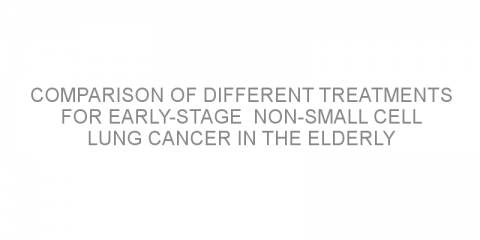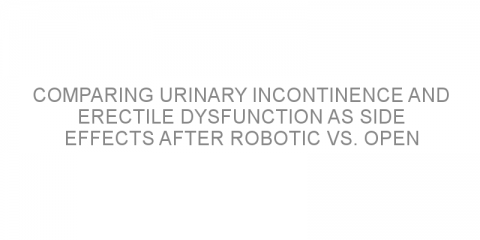In a nutshell This study compared three different treatment strategies for early-stage non-small cell lung cancer (NSCLC) in the elderly. Some background The occurrence of early-stage NSCLC in the elderly is expected to rise by 2030. This will be due to the general increase in an older population as well as the rise in lung-cancer screening for...
Read MoreCurrent stage?-Stage I Posts on Medivizor
Is the initial stage of cancer important in determining treatment?
In a nutshell This study examined whether staging of rectal cancer before starting treatment is important in local excision. Some background Local excision is a surgical procedure that treats cancer in the rectum (end part of the intestine) by removing the tumor and some surrounding tissue. It is suggested that staging of patients could...
Read MoreThe risks of developing a fever during chemotherapy
In a nutshell The authors aimed to determine the risk factors for patients developing a fever during chemotherapy for breast cancer. Some background Febrile neutropenia is the term that describes the development of a fever in a patient who has neutropenia; low levels of granulocytes (a type of white blood cell). This can often be caused by...
Read MoreHER2 testing – is it imperative?
In a nutshell The authors aimed to identify the impact of trastuzumab on cardiac (heart) function when treatment was not specifically restricted to those with human epidermal growth factor receptor 2 positive (HER2+) breast cancer. Some background Trastuzumab is a type of targeted drug used to treat breast cancer. Specifically, it targets...
Read MoreHow does radiation effect patients following prostate surgery?
In a nutshell The authors aimed to determine the effect of early and delayed radiation treatment on patient outcome following prostate surgery. Some background Prostate surgery involves surgically removing the prostate gland in patients with prostate cancer. Radiation therapy involves directing a beam of radiation at the tumor site in order...
Read MoreIs the removal of the breast a reliable treatment for women with low-risk early breast cancer?
In a nutshell The authors aimed to study the best course of surgical treatment for women with low-risk early breast cancer. Some background Breast-conserving therapy (the removal of the tumor and some surrounding breast tissue) is often recommended for women with early breast cancer. It is generally followed by radiation therapy (using radiation...
Read MoreTreatment for breast cancer patients with depression
In a nutshell This article evaluated the benefits of psychology treatments for breast cancer patients with depression. Some background Many women with breast cancer also suffer from depression (22%). This can lead to a decreased quality of life and overall prognosis (treatment outcome). 'Psychodynamic psychotherapy' is a form of...
Read MoreChemotherapy before surgery; is there a different in outcome between different types of breast cancer?
In a nutshell The authors aimed to evaluate if the outcomes of surgery following chemotherapy are different based on the focality of breast cancer tumors. Some background Breast cancer can be characterised as 'unifocal', 'multifocal and 'multicentric'. This refers to the number of areas in which the cancer can be found...
Read MoreTreatment for weak bones during hormone therapy does not affect hormone levels
In a nutshell This article looked at the effects of endocrine therapy on hormonal changes during cancer treatment. Some background Hormone therapy to treat breast cancer is called endocrine therapy. This treatment is used in hormone receptor positive (HR+) early breast cancer. It causes changes to hormone signalling which can lead to early...
Read MoreIs age related to treatment side-effects experienced in prostate cancer patients?
In a nutshell The authors aimed to determine whether age had an effect on patient quality of life after localized prostate cancer treatment. Some background Localized prostate cancer is cancer that is confined within the prostate gland. Treatment for localized prostate cancer can cause undesirable effects in patients, affecting their quality...
Read MoreComparison of different surgical procedures in stage I non-small cell lung cancer
In a nutshell The authors aimed to analyze the effect of different surgical procedures on survival of stage I non-small cell lung cancer (NSCLC) patients. Some background NSCLC is the most common type of lung cancer. In stage I (early stage) NSCLC, surgery is the treatment of choice. There are three main surgical procedures that could be performed...
Read MoreComparing urinary incontinence and erectile dysfunction as side effects after robotic vs. open prostate removal
In a nutshell This study aimed to evaluate the complications associated with robotic-assisted prostate removal (minimally invasive) compared to an open surgical procedure (more invasive). Some background Open surgical removal of the prostate has previously been the traditional surgical approach for prostate cancer treatment. Robot-assisted...
Read More














